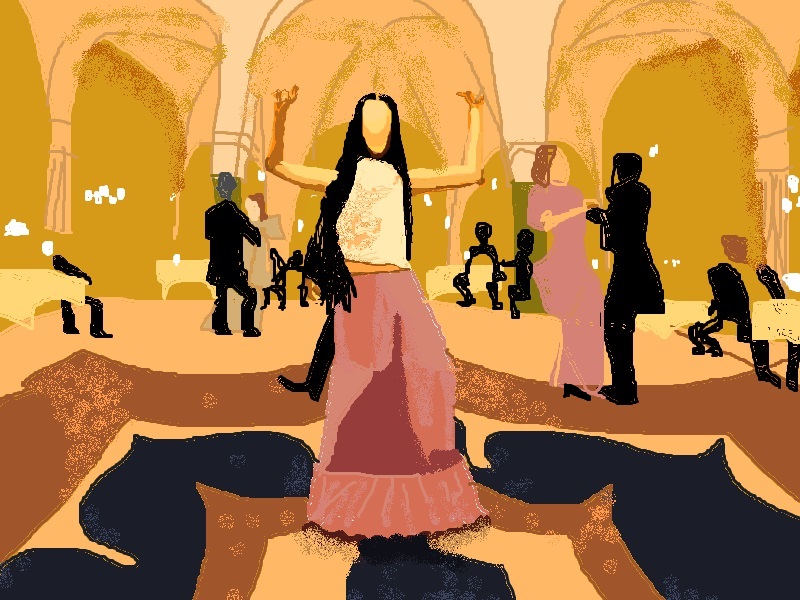Poor Things follows the story of your classic Londoner, Bella Baxter (Emma Stone), a rather unremarkable human, excusing the fact that she was brought back to life after jumping off a rickety London Bridge by none other than ‘God’ himself, a sort of ultimate Frankenstein, Dr Godwin Baxter (played by Willem Dafoe).
Predictably pregnant, in some twisted turn of events Stone’s character has her brain scooped out, her baby gruesomely removed from her body, and its brain slopped into her own skull (‘transplanted’).
While the entire thing feels like outrageous satire, it verges uncomfortably close to the real and wildly interesting world of natural philosophy (aka the root of modern science, before it became rigidly categorised, the synonym of fact, and discovered basic ethics).
Re-christened Bella Baxter, after a quick brain-zapping to get things going and a fair bit of figuring things out (don’t ask), she traverses life like any normal human being, from Lisbon to Alexandria and a brothel in Paris (this last place we spend a lot of time in).
Men fall deeply in love with her – especially the delightfully-named Duncan Wedderburn, played by Mark Ruffalo – as she somewhat uncomfortably comes to terms with language, sex, the world, its stupid manners, sex, and its ultimate existential questions.
This film is not particularly reminiscent of director Yorgos Lanthimos’ last work, The Favourite, which won Olivia Coleman her Oscar, and also starred Emma Stone. However, it does seem to continue his slight obsession with the fish-eye lens – cut interchangeably between swooping Hitchcockian numbers in full black and white, rapid sex, brain dissections, and more sex (this time with [pick one] Mark Ruffalo again / a priest in a brothel / a Dad teaching his children in a brothel / a fellow female colleague / the saggiest (and painfully slowest-to-unbutton-his-trousers) French man you’ve ever seen).
The other continuing theme in this cinematic outing is a stylistic obsession with opulence. Unlike his contemporary directors who often focus on uprooting the lives of the super rich (see dancefloor-murdering Saltburn, for instance), this film embraces extravagance but doesn’t dwell on it. Instead, it dwells on sex. Also routine scoffing of Pastel de Natas, surreal skies, bizarre outfits (e.g. a collar which looks like crinkly cut crisps), and existential despair adorn this fast-paced film like a pearly glint in the eye of a toad.
Talking of pearls, Stone shines in this performance-of-a-lifetime, literally, and Dafoe gives a fitting Frankensteinian tribute, grungy gastric burps aside.
Poor Things is not a film for the casual film-goer, or child, or elderly individual, or anyone with a relatively normal tolerance for sex on screen. As I say, there’s a lot of it in here, as well as some jarringly clean and clear dialogue.
What most appealed about the whole thing was not the sex, despite some thinking it seeks to realistically present female sexuality (and others challenging its male-heavy writership which probably won’t age well). Rather, more simply, there was distinctiveness.
There was little holding back, and much being pushed around (forward would be a stretch as the film had no real end point). The absurdity, the smut, and the orchestrated sloppiness of the whole thing was brandably Lanthimos through and through; from subtle details like colourful pollutants to bloody-body-dragged-across-floor set designs.
This film was, dare I say, disappointingly charming, and firmly rooted in the spirit of 15th Century Renaissance horror. Lanthimos has clearly befriended Rabelais, Magaret Cavendish and a Hunterian Museum curator in his preparatory research.
In short, Poor Things is pure satire – meaning it may well be the closest representation of reality in film in recent times. If that is the ultimate purpose of film then it does well, but if a film is not just meant to push ideas around and provide observations of life, if a film is meant to unlock tangible possibilities, a new way of seeing the world, I don’t know how well it does this.
Like the fish-eye lenses and old cinema call-backs distorting the frame and cracking Willem’s face, the final picture felt somewhat smudged, blurry, and dark in the corners, its identities and messaging fractured and unsure.
